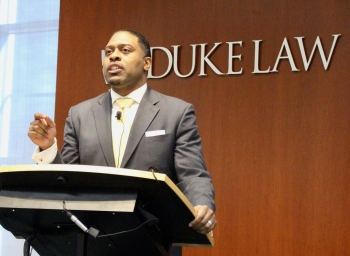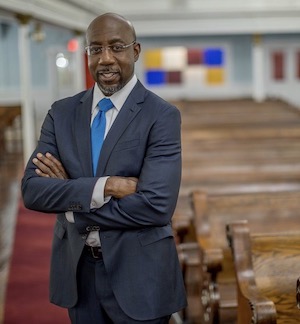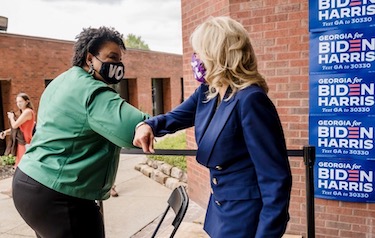Office Hours: Professor Lovelace discusses how the Biden-Harris administration is incorporating the legacy of King and the civil rights movement
Lovelace, an historian of the civil rights movement, sees the resonance of Dr. Martin Luther King, Jr., in the racial equity agenda of the Biden-Harris administration.
 Professor H. Timothy Lovelace, Jr., teaches Advanced Constitutional Law: A Legal History of the U.S. Civil Rights Movement and Race and the Law
Professor H. Timothy Lovelace, Jr., teaches Advanced Constitutional Law: A Legal History of the U.S. Civil Rights Movement and Race and the Law
In his forthcoming book The World is on Our Side: The U.S. and the U.N. Race Convention (Cambridge, 2022) H. Timothy Lovelace, Jr., examines how U.S. civil rights politics shaped the development of the U.N.’s most comprehensive treaty on race.
Lovelace, a professor of law and the John Hope Franklin Research Scholar, is a scholar of legal history, civil rights, human rights, and constitutional law who joined the Duke Law faculty in June 2020 from Indiana University. A chapter from the new book titled “Civil Rights as Human Rights” formed the basis for his Robert R. Wilson Lecture, given while he was a visiting professor at Duke Law in spring 2019.
In his recent scholarship, Lovelace has been exploring how the Biden-Harris campaign and administration have been engaging with the legacy of Dr. Martin Luther King, Jr., and the Southern Christian Leadership Conference. King co-founded the SCLC in 1957 to “Redeem the Soul of America” – a motto Joe Biden adapted as “Restore the Soul of America” for his presidential campaign and subsequent public addresses as president.
In the fourth installment of “Office Hours,” which features conversations with Duke Law faculty, Lovelace spoke about how the Biden-Harris administration is incorporating King’s legacy into its own civil rights agenda, how modern-day protests reflect demonstrations of the past, and the increasing recognition of Black women leaders in today’s social movements.
Joe Biden has had some awkward moments explaining positions he’s taken on civil rights issue over his nearly 50 year career. Is his embrace of Dr. Martin Luther King, Jr., genuine?
I think Biden is sincere. He really wrapped his campaign, and now his administration, in the mantle of the SCLC and Dr. King’s legacy. During the campaign there were several pressing questions about Biden’s civil rights record from his time as a senator. One of the sharpest exchanges around his record occurred during the Democratic primary when Kamala Harris criticized Biden about his position on court-ordered busing during America’s school desegregation battles. Biden had been deeply critical of busing. On the other hand, Harris was a beneficiary of busing, and Dr. King was a proponent of busing. This tension raised serious concerns about Biden’s commitment to civil rights.
Joe Biden became president during the most powerful struggle for civil rights since the 1960s. Lyndon Johnson also became president at a time when there was a great social movement for racial justice, and he helped to shepherd the Civil Rights Act of 1964, the Voting Rights Act of 1965, and the Civil Rights Act of 1968 through Congress. For many people, Johnson’s background did not suggest that he would be the person to shepherd major civil rights legislation through Congress. He grew up in the segregated South but his actions ended up being much bigger than his background might suggest. I think there are parallels between Johnson and Biden. Biden’s background might similarly suggest that he would not be willing to shepherd civil rights legislation through Congress. However, I believe that Biden is very committed to uprooting systemic racism, and I hope he pursues civil rights reform in a way that no President has done at least since Johnson.

Your new article "To Restore the Soul of America: How Domestic Anti-Racism Might Fuel Global Anti-Racism" focuses on how the Biden-Harris administration can invoke the legacy of Dr. King to recalibrate the international legal order. What does that entail?
One of Joe Biden’s priorities is to restore America’s moral leadership around the world and part of this endeavor means that United States has to re-engage in international institutions. Under the Trump administration, for example, the United States left the U.N. Human Rights Council. Restoring America’s moral credibility in this area requires the United States rejoin the U.N. Human Rights Council and then provide meaningful leadership there.
The U.N. Human Rights Council has hosted internal debates around systemic racism, offered several powerful proclamations decrying systemic racism, and urged countries to address systemic racism within their societies. While many might think that the U.N.’s anti-racist efforts are unprecedented, in some ways this is not new, and for Biden the past can be instructive. During the Cold War, ending systemic racism was an international priority as countries throughout Asia, Africa, and Latin America became independent from their colonial rulers. Dr. King profoundly understood at that time that tackling racism at home would improve the U.S.’s standing abroad. If Biden wants to restore the U.S.’s standing around the world, then he can pursue this goal in a manner like King and more broadly progressive U.S. policymakers did in the past. Improving race relations domestically will give the U.S. more credibility internationally and can help facilitate Biden’s efforts to reestablish U.S. leadership.
In your book you discuss Morris Abram and Claude Ferguson, civil rights lawyers representing the U.S. in 1963 and 1964 at the U.N. Sub-Commission on the Prevention of Discrimination and Protection of Minorities – at a time when the U.S. was still enforcing Jim Crow laws. Are there similar figures holding this administration accountable?
Although the Cold War is over, there are a number of policymakers in the Biden administration who are in the mold of Abram and Ferguson and who are pressing the administration to live up to its promise. In the book I argue that during the civil rights movement, U.S. officials recognized that racism tarnished America’s global image. The State Department, in response, recruited individuals like Abram, a Jewish civil rights lawyer, and Ferguson, an African American civil rights lawyer, to provide the U.S. descriptive and substantive representation at the United Nations. Abram and Ferguson literally embodied the U.S.’s commitment to justice.
I think something analogous has happened during the Biden administration. Today our country is again publicly confronting issues of inequality and injustice. Biden has pledged to combat racism, and he plans to do this by relying on a diverse cabinet. Biden’s selection of Linda Thomas-Greenfield as the U.S. Ambassador to the United Nations echoes the selections of Abram and Ferguson. Thomas-Greenfield, like Abram and Ferguson, was born in the segregated South, and throughout her career she’s promoted racial equality. Abram and Ferguson had foreign policy experience, and Thomas-Greenfield has led a distinguished foreign service career. Biden’s selection was no doubt strategic, particularly given our historical moment. What’s also notable here is that her experiences, as an African American woman, offer the U.S. a form of representation that Abram and Ferguson could not bring to the table during their time at the U.N.
Joe Biden has always touted his ability to work across the aisle. Are his calls for bipartisanship likely to resonate now?
I wish that bipartisanship could be a reality, but unfortunately U.S. politics today are more polarized now than at any other moment in our lifetimes. Given the levels of polarization in American society and Congress’ current composition, I’d offer two recommendations to the President if he seeks to pass significant civil rights legislation. First, the history of American race relations strongly suggests that Biden should act now in the area of civil rights. Racist backlash often follows racial progress. After Reconstruction, there was the rise of Redemption and then Jim Crow. After Brown v. Board of Education, Massive Resistance developed. After Obama’s election, Trumpism blossomed. It’s important to seek civil rights legislation now because it’s morally right. It’s also important to seek civil rights legislation now because greater backlash might soon follow this historic election and defeat of Trump. In fact, we’ve already seen backlash on January 6th as white nationalists stormed the U.S. Capitol.
The second point here is that midterm elections will come soon. There might be a short window for Biden to pass significant civil rights legislation. Early in Obama’s first term there was great congressional backlash and obstructionism. The same thing might happen in 2022, so Biden should seize the day to advance the cause of civil rights.

Another echo of King comes in Rev. Raphael Warnock winning his Senate race, and perhaps being a deciding vote on such legislation.
Dr. King would certainly be proud that the senior pastor of his home church, Ebenezer Baptist Church, is now a U.S. senator and the first African American senator from Georgia. Senator Warnock often weaves King’s ideas seamlessly into his sermons and policy positions. Warnock preaches a social gospel, a tradition which emphasizes that God is concerned with more than personal salvation. God is also concerned about issues of social justice, and that He has a special concern for those who are oppressed.
Warnock has a powerful theopolitical vision of justice like King. Over the King holiday weekend Warnock preached a sermon that showcased this connection. He drew from a passage in the Book of Isaiah that declares that “every valley shall be lifted up and every mountain and hill be made low.” Warnock argued that this was a vision of equity – that God had a vision of equity long ago that should inform not only how we carry out our day-to-day lives but also a vision of equity that should inform law and policy. That idea of a level playing field is the spirit that motivates Warnock’s vision in the pulpit and in politics. He is able to translate the gospel into politics in a way that will help subordinated people and in a way that would make King incredibly proud.
Your forthcoming essay for Northwestern Law Review, “Of Protest and Property: An Essay in Pursuit of Justice for Breonna Taylor,” examines the struggle to find justice for Breonna Taylor through the lens of the civil rights movement. What did you find?
In the essay, I argue that while there were strong criticisms of the demonstrations seeking justice for Breonna Taylor, many of the demonstrations mirrored those during midcentury campaigns to desegregate public accommodations. The Louisville activists relied on tactics like sit-ins on private property to dramatize the need for immediate action in Taylor’s case. Activists past and present literally used their bodies to make claims about what justice should look like, how prosecutors should act, and how police officers should police. Contemporary activists carried protest signs and used call-and-response songs like those in the past. Everyday people in both eras relied on civil disobedience to create the context for legal change—and in both eras these activists were rebuked as “outside agitators” and troublemakers in their pursuits of justice.
However, one of the most striking departures from the civil rights movement was the contemporary intersectional approach to the protests. Activists in Louisville were chanting “Say her name,” urging society to acknowledge that African American women are also victims of police violence. The phrase of “Say her name” was popularized by Kimberlé Crenshaw, a law professor at UCLA, a pioneer in critical race theory, and the scholar who’s developed the concept of intersectionality– that the experiences of African American women are not simply the experiences of African American men plus the experiences of white women. African American women often face particular and even unique structural problems. Activists in the streets, most of whom never attended law school, were very much in conversation with critical race theory as they chanted, “Say her name” seeking justice for Breonna Taylor.

Is it notable that Black women have taken leadership positions in these social movements?
It is notable. Many of the contributions of Black women have been erased from history, and Black women were marginalized even within many civil rights institutions in the 1960s. The Black Lives Matter Movement’s inclusive model of leadership reflects a powerful critique of sexism during the civil rights movement, and this model builds on the trailblazing efforts of civil rights activists like Ella Baker, Fannie Lou Hamer, and Diane Nash. This model is long overdue public acknowledgment that women can be and are leaders, and they need to be recognized as such.
Here, it’s also crucial to highlight the origins of the Black Lives Matter Movement. Three Black women founded Black Lives Matter, the organization, and they coined the hashtag #BlackLivesMatter. Without Black women there would be no Movement for Black Lives.
In your Advanced Constitutional Law class you analyze what causes social movements to fail. What do movements like Black Lives Matter and Black Voters Matter need to keep momentum?
Organizing is essential to any social movement. There have to be many activists and organizations committed to what Ella Baker described as ‘spadework’—the slow and respectful work of teaching people to transform their lives for themselves. During the Black Lives Matter Movement, we’ve witnessed the power of organizing. New leaders have emerged, our vocabulary around anti-racism has become more sophisticated, activists have started new organizations and revitalized older organizations, and people and institutions that were lukewarm about racial justice just a few years ago are now interested in ending systemic racism. These developments bode well for the future of the Black Lives Matter Movement.
I think the incredible efforts of Black Voters Matter, as well as the work of many others in Georgia including Stacey Abrams, vividly illustrate how insights from the organizing tradition can help to transform politics. What these activists recognize is that while election day is important, social movements are about more than election day. Social movements are also about what happens between election days. Activists must train others so that these new disciples can teach their neighbors about the power of voting, the candidates and issues that are on the ballot, and policy solutions to improve their lives. The electoral shift in Georgia, most notably, has inspired socially minded people across the country. These recent developments, coupled with demographic shifts, could spark similar transformations in other states. I’m confident that this energy and commitment to organizing will remain strong over time.

On the other hand, I’m also confident that the energy unleashed by former President Trump is not going to die easily either. The events leading to and on January 6th sadly illustrated this fact. There are major media outlets, politicians at every level of government, and organizations wedded to disinformation and white nationalism. There were tens of millions of Americans who enabled this behavior. January 6th did not emerge from a vacuum. It is time for all Americans, regardless of background, to tell the truth about this unfortunate reality. Our democracy is at a crossroads. It’s going to take incredible political will and moral courage to confront, but we must be prisoners of hope in the traditions of Dr. King and Ella Baker. We will not be able to build the democracy we need if we cannot be honest about the one we have.